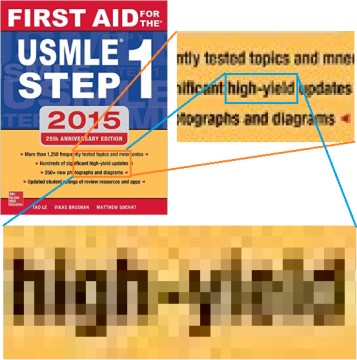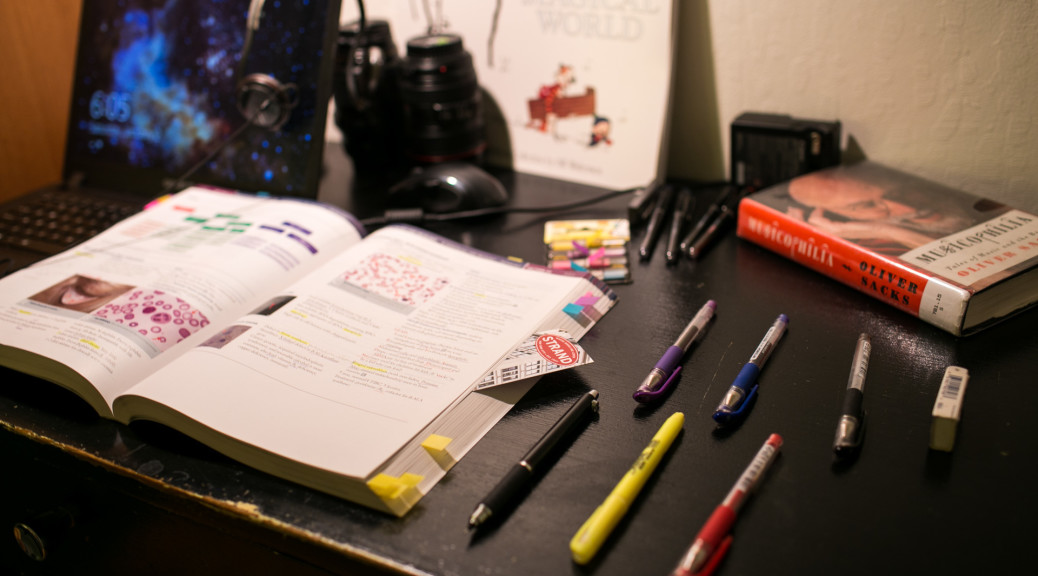“High-Yield.” What a phrase. I don’t know how or when it was commandeered for medical education, but it’s the tag that study guides have adopted to mean “yo dawg, test questions ask this all the time so memorize it.” For us students with finite memories and limited study time and lots of people to impress, “high-yield” are words we cling to dearly.
I’ve been gulping down a high-yield fire-hose of facts. The Step 1 board exam is a formidable 8-hour exam that broadly tests basic clinical medicine, and for six weeks I’ve been blitz-studying for it. Forget running, forget hobbies, forget talking to people, I just tried to bury my face in books and videos for 9-13 hours a day, 7 days a week.
Here’s a sample of that dull lifestyle: watch this YouTube clip of Pathoma. It’s basically the author reading his review book out loud except with doodled diagrams and with high-yield information prefaced with phrases like “this is high-yield, especially for the purposes of board examinations” and “this is a particularly high-yield concept so let me say that again: a high yield concept is that…”. Ironically, those phrases add considerable length to his 35-hour video series, but that’s okay because all us med students save time by watching it at 2x speed (you can too, under the gear icon of the YouTube player!). We’re used to it becasue we also watch lecture recordings at 2x… Yet, at this ridiculous wpm, our ears instantly perk up at the mention of “high-yield.” High-yield is like a little brat holding a blowhorn trying to get attention by being annoying. As the mantra goes, if Dr. Sattar says it twice, it’s gotta be high-yield.
My key study resource was First Aid, 600 pages of pure condensed facts and mnemonics. It’s considered the second year med student bible, and it freaking says high-yield on the cover.

I couldn’t have finished studying without the help of “high-yield.” Reclaiming 1.5 years of minutia and holding it in surface memory is quite a stretch, but these high-yield associations structured it for me.
Nonetheless, this attitude made me uneasy. High-yield for the purposes of board examinations does not equate high-yield in clinical practice because testable does not mean practical. Must I possess instant recall of the fact that von Hippel-Lindau disease’s mutation lies on chromosome 3? It’s an autosomal dominant congenital syndrome with an incidence of 1:36,000 that presents with slow-growing tumors. The disease is not going to catch me off guard, and chromosomal information doesn’t affect treatment or steer conversation anyway. Yet, First Aid has a mnemonic for that! VHL = 3 letters.
After I take Step 1 on Monday, I expect to immediately forget a large percentage of what I’ve memorized. In our age of information supersaturation and instant digital data retrieval, we must strive to fill our brains with expected relative importance. Pretty soon the knowledge we’ll want is the nuances of exceedingly common diseases like diabetes, heart failure, and asthma. I believe that statistical likelihood is crucial knowledge for responsible doctoring. Lacking that perspective means we’d be scanning brains left and right for every headache we encounter because we learned more about glioblastomas than headaches.
Yes, details are a matter of life and death in medicine, and there are some factoids that deserve remembering. They are the critical, the lethal, the ones so urgent that no time should be wasted. For instance, if someone has a one-sided headache and clenched jaw, I’ve got to remember to immediately infuse high-dose steroids. It might be an overly cautious knee-jerk reaction, but someday one of those patients will actually have temporal arteritis. Same goes with remembering hemorrhagic strokes before giving tPA, or having dantrolene ready during anesthesia, or treating alcohol overdose with thiamine and glucose. Those are the true high-yield associations, especially for the purposes of being a responsible doctor.
PS. there is value in knowing things; I would garner little confidence from patients if I constantly interrupted them to google stuff. haha
PPS: way more entertaining than Pathoma is Sketchy MIcro. I recommend it highly to anyone taking Step 1 in the future.
